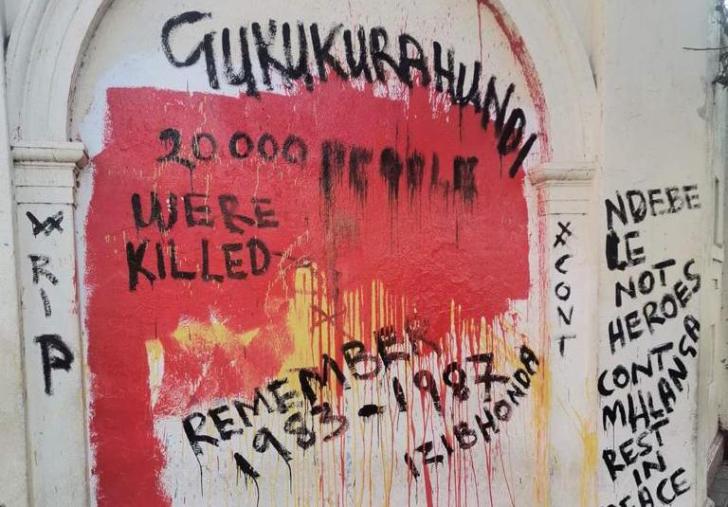News / National
GUKURAHUNDI KILLINGS: Hearings set for January 2024
17 Dec 2023 at 08:04hrs |
1 Views

Public hearings addressing civil disturbances during the 1980s, particularly the Gukurahundi era, are poised to commence early next year. Spearheaded by over 70 traditional chiefs from Matabeleland North and South provinces, these hearings aim to not only offer closure to the tumultuous post-independence clashes but also to provide a platform for those directly and indirectly affected to voice their experiences and propose community-driven solutions.
President Mnangagwa's administration has expressed a commitment to confronting the nation's painful history by addressing unresolved issues tied to these disturbances. The restorative justice approach seeks to bring healing to the communities that bore the brunt of the civil unrest.
Unity Day, commemorated this Thursday, marks the signing of the historic Unity Accord in 1987, a pivotal agreement that quelled political tensions and violence following Zimbabwe's independence.
Chief Mtshane Khumalo, president of the National Council of Chiefs, revealed that training sessions for rapporteurs have been successfully completed. In a meeting scheduled for today, the Chiefs' Council will discuss progress and coordinate the launch of the outreach program, led by President Mnangagwa.
Government support for the initiative was underscored by the provision of laptops, recorders, and printers to 72 traditional chiefs in Matabeleland North and South. These tools aim to enhance the efficiency of the chiefs and their rapporteurs during the hearings.
Chief Khumalo acknowledged President Mnangagwa's facilitation of the equipment, emphasizing its significance in recording proceedings during the upcoming hearings. The data captured will contribute to a comprehensive report presented to the President upon the conclusion of the public hearings.
Scheduled to commence early next year, the hearings will initially focus on Matabeleland North and South provinces before extending to the Midlands. The gathered information will be compiled into a document for presentation to President Mnangagwa, who will guide the subsequent steps.
The community engagement manual, designed to guide the hearings, outlines the importance of inclusivity. Special groups, including alleged victims of rape, sodomy, and torture, as well as lobby groups, activists, ex-combatants, people with disabilities, and the elderly, are expected to participate fully.
The manual underscores the need for non-partisan, victim-centered discussions and encourages open dialogue to guide remedial interventions benefiting victims and the broader community.
This concerted effort to address the historical wounds of Gukurahundi, initiated in 2019 through government collaboration with the Matabeleland Collective, reflects a significant stride toward national reconciliation. Political analyst Dr. Hamadziripi Dube praised the government's commitment to peace-building and healing, emphasizing the importance of engaging affected communities in the process. Attorney-General Mrs. Virginia Mabhiza echoed the sentiment, characterizing the hearings as historic and illustrative of the Second Republic's dedication to fostering a culture of peace and harmony.
President Mnangagwa's administration has expressed a commitment to confronting the nation's painful history by addressing unresolved issues tied to these disturbances. The restorative justice approach seeks to bring healing to the communities that bore the brunt of the civil unrest.
Unity Day, commemorated this Thursday, marks the signing of the historic Unity Accord in 1987, a pivotal agreement that quelled political tensions and violence following Zimbabwe's independence.
Chief Mtshane Khumalo, president of the National Council of Chiefs, revealed that training sessions for rapporteurs have been successfully completed. In a meeting scheduled for today, the Chiefs' Council will discuss progress and coordinate the launch of the outreach program, led by President Mnangagwa.
Government support for the initiative was underscored by the provision of laptops, recorders, and printers to 72 traditional chiefs in Matabeleland North and South. These tools aim to enhance the efficiency of the chiefs and their rapporteurs during the hearings.
Scheduled to commence early next year, the hearings will initially focus on Matabeleland North and South provinces before extending to the Midlands. The gathered information will be compiled into a document for presentation to President Mnangagwa, who will guide the subsequent steps.
The community engagement manual, designed to guide the hearings, outlines the importance of inclusivity. Special groups, including alleged victims of rape, sodomy, and torture, as well as lobby groups, activists, ex-combatants, people with disabilities, and the elderly, are expected to participate fully.
The manual underscores the need for non-partisan, victim-centered discussions and encourages open dialogue to guide remedial interventions benefiting victims and the broader community.
This concerted effort to address the historical wounds of Gukurahundi, initiated in 2019 through government collaboration with the Matabeleland Collective, reflects a significant stride toward national reconciliation. Political analyst Dr. Hamadziripi Dube praised the government's commitment to peace-building and healing, emphasizing the importance of engaging affected communities in the process. Attorney-General Mrs. Virginia Mabhiza echoed the sentiment, characterizing the hearings as historic and illustrative of the Second Republic's dedication to fostering a culture of peace and harmony.
Source - Byo24News
Join the discussion
Loading comments…





























